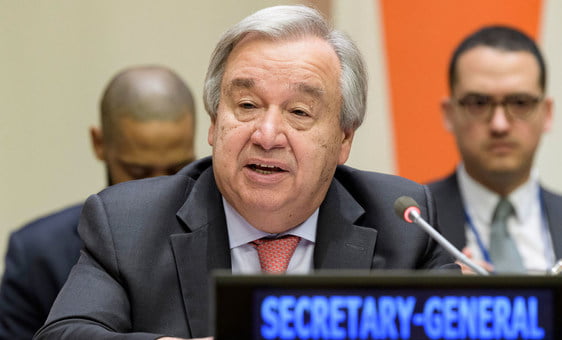The United Nations has launched a Strategy and Plan of Action on Hate Speech, calling for hate speech to be treated like any other malicious act “by condemning it unconditionally, refusing to amplify it, countering it with the truth, and encouraging the perpetrators to change their behaviour.”
UN Chief Antonio Guterres said “hate speech may have gained a foothold, but it is now on notice. We will never stop confronting it.”
Hate speech sowed the seeds of the Holocaust by building on millennia of scapegoating and discrimination against the Jews. It was also a direct precursor to genocide in Rwanda, Bosnia and Cambodia, and to recent violence in New Zealand, Sri Lanka and the US.
But Guterres fears “we are in danger of forgetting this lesson.”
In the seventy-five years since the creation of the UN Charter, and after experiencing genocide on an industrial scale in the twentieth century, we’re experiencing a fresh “groundswell of xenophobia, racism and intolerance, violent misogyny and also anti-Semitism and anti-Muslim hatred,”
The issue has become increasingly relevant in an age of social media trolling and fake news.
Guterres points out how “hateful and destructive views are enabled and amplified through digital technology, often targeting women, minorities, and the most vulnerable”.
It even operates on a government level. “In both liberal democracies and authoritarian regimes, some political leaders are bringing the hate-fuelled ideas and language of these groups into the mainstream, normalising them, coarsening the public discourse and weakening the social fabric.”
We saw how this works in Malta with The Shift News investigation into secret online Labour Party hate groups.
Guterres believes the problem can be addressed by bringing opposing groups and individuals together, and by working with both traditional and social media platforms to build counter-narratives. “The recent emergence of volunteer groups that are organising to counter harassment and hate online shows the potential for collaboration.”
But countering the narrative is not enough. Efforts must also be made to find the root causes of hate speech, measure its impact, identify those who engage in hate speech, and provide assistance to those who are in a position to challenge it.
The UN plan aims to uphold freedom of speech while ensuring hate speech does not escalate into more dangerous forms prohibited under international law, including the incitement to violence, hostility and discrimination.
The United Nations urges governments, technology companies, and educational institutions to help by stepping up their response to this dangerous issue.












